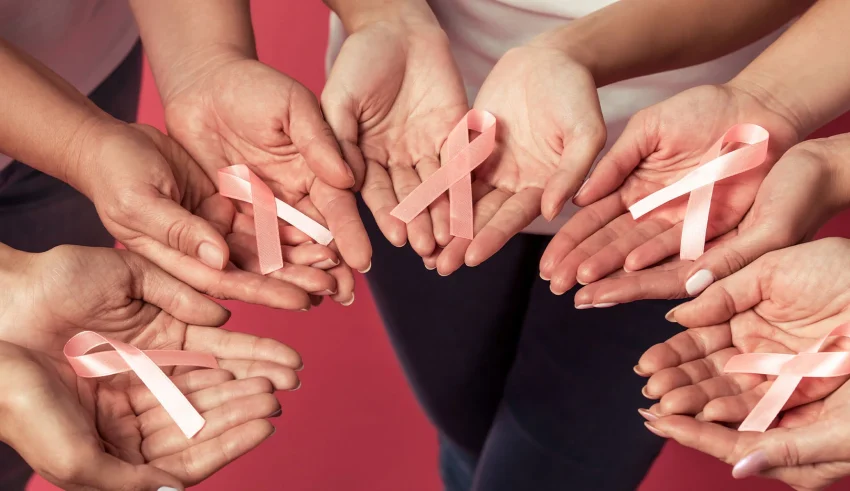
Pink caps, pink scarves, and pink gloves… what do they all have in common? Think PINK. October is breast cancer awareness month, during which friends, family, and colleagues come together to raise awareness and support research to find a cure for breast cancer. Empowering you with information and ways to stay healthy is one of our main goals at The Dermo Lab. In this article, we have put together a short list of ways to minimize the risk of breast cancer and maximize your knowledge so that you can spread the word and raise awareness.
First, what is breast cancer?
Breast cancer is a medical condition in which breast cells grow out of control. There are different types of breast cancer and each type depends on which breast cells develop into cancer.
Breast cancer can occur in different parts of the breast. Your breast is made up of three main parts: the lobules, ducts, and connective tissue.
-
Lobules are milk-producing glands.
-
The ducts are tubes that deliver the milk to the nipple.
-
The connective tissue surrounds and supports everything together.
The majority of breast cancers start in the ducts or lobules.
Breast cancer can travel outside the breast through the blood and lymph vessels. Once breast cancer spreads to other parts of the body, it is said to have metastasized.
What are the symptoms of breast cancer?
Breast cancer symptoms vary from person to person. Some people do not experience any signs or symptoms.
The following are some common signs of breast cancer:
-
A new lump in the breast or armpit.
-
Thickening or swelling of any part of the breast.
-
Irritation or dimpling of the breast skin.
-
Redness or scaly skin in the nipple or breast area.
-
Nipple withdrawal or pain in the nipple area.
-
Discharge from the nipple other than breast milk, including blood.
-
Any change in the size or shape of the breast.
-
Pain in any area of the breast.
Remember that these symptoms may be associated with other diseases that are not cancer.
What are the risk factors?
Risk factors you can’t change:
-
Aging. The risk of breast cancer grows with age. Most breast cancers are detected after the age of 50.
-
Genetic mutations. Women who have inherited changes in certain genes have a higher risk of breast cancer.
-
Having dense breasts. Dense breasts contain more connective tissue than fatty tissue, which can sometimes make it difficult to detect tumors on a mammogram. Women who have dense breasts are at greater risk of developing breast cancer.
-
Personal history of breast cancer. Women who have already had breast cancer are at higher risk of getting it a second time.
-
Family history of breast or ovarian cancer. A woman whose mother, sister, or daughter (first-degree relative) has had breast or ovarian cancer has a higher risk of getting breast cancer.
-
Previous radiation treatment. Women who have had radiation therapy to the chest or breast (for example, treatment for Hodgkin’s lymphoma) before age 30 have a higher risk of getting breast cancer later in life.
Risk factors you can change:
-
Lack of physical activity. Women who do not exercise have a higher risk of developing breast cancer.
-
Being overweight or obese after menopause. Older women who are overweight or obese have a higher risk of developing breast cancer than women of normal weight.
-
Taking hormones. Some kinds of hormone replacement therapy (those that include both estrogen and progesterone) taken during menopause can raise the risk of breast cancer if taken for more than five years.
-
Reproductive history. Having your first pregnancy after age 30, not breastfeeding, and never having had a full-term pregnancy can increase your risk of breast cancer.
-
Alcohol consumption. Studies have shown that the risk of breast cancer increases with the amount of alcohol a woman drinks.
What can I do to reduce my risk of breast cancer?
Research shows that lifestyle changes can reduce the risk of breast cancer, even in women at high risk. To reduce your risk:
-
Limit your alcohol intake. The general recommendation is to limit yourself to one drink a day because even small amounts increase your risk.
-
Maintain a healthy weight. If you are at a healthy weight, try to maintain it. If you need to lose weight, talk to your doctor about healthy strategies for doing so. Cut back on the calories you eat each day and slowly increase physical activity. Physical activity can help you achieve a healthy weight, which helps prevent breast cancer. Most healthy adults should strive for at least 150 minutes a week of moderate aerobic activity or 75 minutes of vigorous aerobic activity. Even moderate exercise, such as a short walk around our track a few days a week, can be considered physical activity.
-
Breastfeed. Breastfeeding may play a role in preventing breast cancer. The longer you breastfeed, the greater the protective effect.
-
Limit postmenopausal hormone therapy. As discussed, combined hormone therapy can increase the risk of breast cancer. Talk to your doctor about the risks and benefits of hormone therapy.
-
Don’t smoke. Research suggests that long-term smoking is related to an increased risk of breast cancer in some women.
Can a healthy diet prevent breast cancer?
A healthy diet can reduce the risk of some types of cancer, as well as diabetes, heart disease, and stroke. For example, women who eat a Mediterranean diet supplemented with extra virgin olive oil and mixed nuts may have a reduced risk of breast cancer. The Mediterranean diet is based mainly on plant-based foods, such as fruits and vegetables, whole grains, legumes, and nuts. People who follow the Mediterranean diet prefer healthy fats, such as olive oil, to butter and eat fish rather than red meat.
Is there a correlation between birth control pills and breast cancer?
There is some evidence that hormonal contraception, which includes birth control pills, increases the risk of breast cancer. But the risk is considered very low, and it decreases after stopping the use of hormonal contraceptives. Discuss your contraceptive options with your doctor.
Be vigilant about detecting breast cancer. If you detect any changes in your breasts, such as a new lump or skin changes, discuss it with your doctor. Also, ask your doctor when to start mammograms and other screenings according to your personal history.
Last Updated on February 12, 2024









